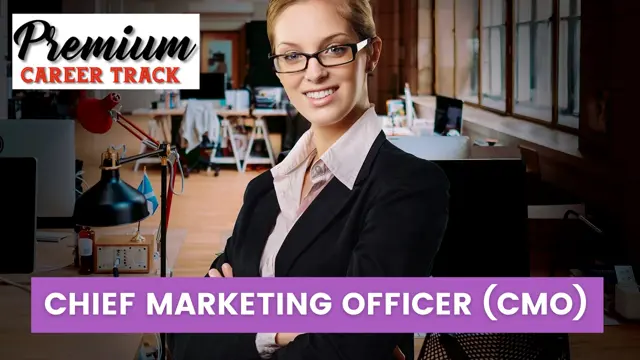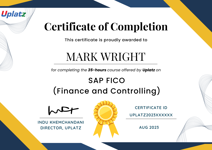
Chief Marketing Officer (CMO) Premium Career Track
Program consisting of courses to help you fulfil your dream of becoming a C-Level Executive (CMO) in a top organization
Uplatz
Summary
- Uplatz Certificate of Completion - Free
Add to basket or enquire
Overview
Uplatz provides this intense Premium Career Track program on Chief Marketing Officer (CMO). It is a program covering all topics related to Finance, as self-paced video lectures. The program will help you pursue a career towards becoming a CMO. You will be awarded Course Completion Certificate at the end of the course.
This Premium Career Track - Chief Marketing Officer (CMO) program by Uplatz includes the following courses:
- Fundamentals of Digital Marketing
- Fundamentals of Marketing
- Digital Marketing & SEO
- Professional Diploma in Digital Marketing
- Leadership and Management
- Product Management
What is a Chief Marketing Officer (CMO)?
A chief marketing officer is a corporate executive who is tasked with overseeing the marketing and sales activities of an organization. Other terms that are used to refer to the chief marketing officer include Marketing Director and Global Marketing Officer.
An individual appointed to the CMO role is expected to lead the company’s advertising activities, brand management, market research, product development and management, marketing communications, pricing, and customer service. The CMO manages a team of marketing professionals, and in turn, reports to the CEO of the company.
A CMO (chief marketing officer) is a C-level corporate executive responsible for activities in an organization that have to do with creating, communicating and delivering offerings that have value for customers, clients or business partners.
A CMO's primary mission is to facilitate growth and increase sales by developing a comprehensive marketing plan that will promote brand recognition and help the organization gain a competitive advantage. In order to achieve their own goals and effectively shape their companies' public profile, CMOs must be exceptional leaders and assume the voice of the customer across the company.
Chief marketing officers typically report to the CEO and hold advanced degrees in both business and marketing. A CMO who has a strong background in information technology may also hold the job title chief marketing technologist (CMT). In some larger organizations, however, those positions are separate and the CMT reports to the CMO.
Why the CMO role has gained prominence
The technology advancements of the 21st century have elevated the importance of the CMO position in many organizations. The internet, the ubiquity of mobile computing, the IoT, analytics, artificial intelligence and social media platforms all have created new ways to reach customers and understand their thoughts on products, services and brands.
They also have given a new, much more prominent voice to consumers who can instantaneously broadcast their opinions to potentially thousands, if not millions, of people.
At the same time, CMOs and their teams are able to tap those technologies to reach and influence customers, position their products and challenge competitors at the same speed and scale as the customers.
As it has been with other C-suite executives in this new technology-driven business paradigm, the CMO must collaborate much more extensively with his or her executive peers in order to keep pace. CMOs also must be capable of adaptation and innovation, as technologies evolve and markets shift in response.
Course media
Description
Responsibilities of a Chief Marketing Officer
The main function of a chief marketing officer is to help the company increase its revenues by creating a marketing plan that gives the company a competitive advantage. To help achieve the company’s objectives, the CMO is required to possess skills in business and marketing.
Some of the roles and responsibilities that a CMO is required to perform in the corporate world include:
1. Brand management
Brand management refers to the practice of creating a relationship between the company’s products and the target market. A company aspires to create and maintain a good relationship with its customers because it builds brand loyalty.
The elements of brand management may be tangible (such as the product itself, pricing or packaging) or intangible (personal experiences of customers). The CMO uses different strategies to increase brand awareness of the company’s products and boost the perceived value of the brand vis-à-vis what competitors offer.
2. Market research
Market research refers to the process of gathering crucial information about the target market of the company’s products. The CMO uses various techniques to collect important information about the target market that helps identify the needs of the market, the competition, and the popularity of the company’s products among consumers.
Some of the techniques used to conduct market research include customer surveys, focus group discussions, and distributor surveys. The collected data is then analyzed using statistical methods, and the results organized in the form of graphs and charts for easy interpretation. The CMO uses the results to make a presentation to the CEO and other executives on the research findings.
3. Marketing communications
Marketing communications involve managing the way the company communicates important information to the target market. The CMO works to ensure that the intended message is clear and consistent, and focused on the desired market. Marketing communication tools may include things such as advertising, direct markeing, and sponsored events.
All the communication tools are intended to inform the public about the brand. With businesses going global and customers showing greater internet use, CMOs are faced with a new challenge of finding the most effective communication tools that allow them to communicate the required information to the intended audience.
4. Product management
Product management involves new product development and product marketing. These are two complementary roles geared toward maximizing revenues and market share. Product development involves building new products to be offered to consumers.
Some of the CMO’s roles in the product development phase include conducting feasibility studies of proposed products and identifying customer needs.
Product marketing, on the other hand, involves launching new products, creating promotions and messaging, monitoring the competition, and receiving customer feedback.
The CMO has a breadth of roles and responsibilities to support its overall mission. Those include:
- overseeing the development and placement of the creative elements that position the company in the marketplace;
- researching and assessing the market and the company's position in it;
- supervising or collaborating with sales to turn marketing insights into sales; and
- directing the company's public relations efforts, or working in conjunction with internal and external public relations teams to create a coordinated message.
Qualifications of a Chief Marketing Officer
One of the basic qualifications for the CMO role is a bachelor’s degree in marketing or related fields. An MBA in Marketing or Business is also preferred by most companies, if not required. They are also required to have several years of experience in marketing, with a preference for professionals who have worked in a similar industry. Further, CMOs are required to have held a managerial role, with direct supervision of seven to ten marketing staff.
The following are other qualifications for being a CMO:
- Strong leadership skills
- Excellent communication skills, both written and verbal
- Proven understanding of data analysis tools
- Ability to lead in a constantly evolving environment
- Experience working with various marketing tools relating to market research, data analytics, website development, product branding, visual communication software, written communication, and public relations
- Proven ability to design and coordinate marketing campaigns across traditional and modern channels
- Expert in digital and social media marketing
CMOs, who may also have the title of vice president of sales and marketing, generally have at least a bachelor's degree in marketing (although an MBA is often preferred, if not also required). They generally have at least a decade of experience in marketing and/or advertising and multiple years of experience in a managerial role.
They're expected to have strong leadership skills, experience in project development, excellent communication skills and a high level of business acumen.
In addition, the CMO role today requires a high level of technical aptitude to maximize the tools and leverage the social media platforms that are essential to marketing efforts.
For instance, CMOs are expected to oversee the company's use of analytics platforms to understand customer preferences, priorities and patterns particularly through user-generated media and how that insight can drive sales.
They're also expected to direct marketing campaigns and customer outreach via existing -- and emerging -- social media sites, as well as through traditional channels.
To that end, CMOs must be highly inquisitive and innovative, able to identify emerging technologies that could disrupt their business or industry and also then able to respond to that by directing his or her C-suite colleagues on how to reposition the company in light of that change.
Who is this course for?
Everyone
Requirements
Passion and determination to make it to the top of the corporate ladder!
Career path
- Chief Marketing Officer (CMO)
- Chief Executive Officer (CEO)
- Marketing Director
- Marketing Manager
- Sales & Marketing Management Executive
- Director - Sales
- Director - Marketing
Questions and answers
Currently there are no Q&As for this course. Be the first to ask a question.
Certificates
Uplatz Certificate of Completion
Digital certificate - Included
Course Completion Certificate by Uplatz
Reviews
Currently there are no reviews for this course. Be the first to leave a review.
Legal information
This course is advertised on reed.co.uk by the Course Provider, whose terms and conditions apply. Purchases are made directly from the Course Provider, and as such, content and materials are supplied by the Course Provider directly. Reed is acting as agent and not reseller in relation to this course. Reed's only responsibility is to facilitate your payment for the course. It is your responsibility to review and agree to the Course Provider's terms and conditions and satisfy yourself as to the suitability of the course you intend to purchase. Reed will not have any responsibility for the content of the course and/or associated materials.



